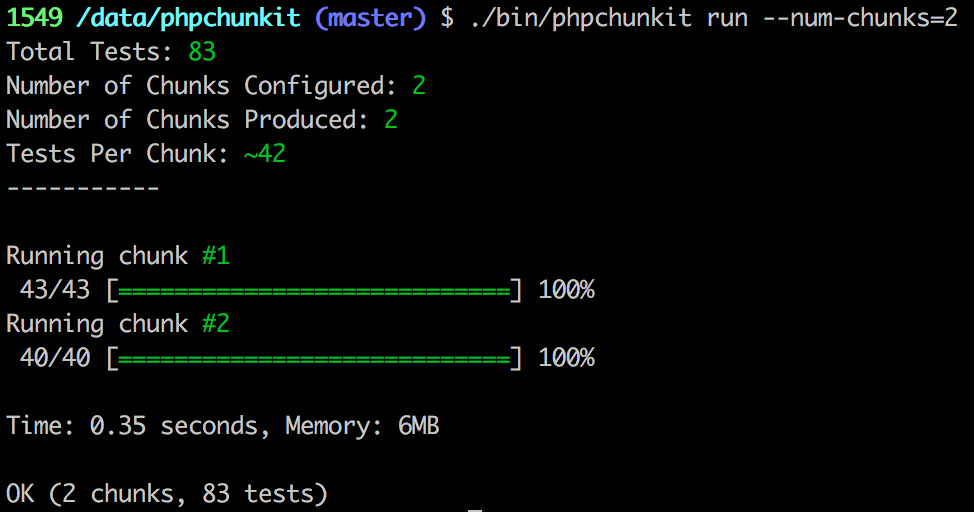PHPChunkit is a library that sits on top of PHPUnit and adds additional functionality to make it easier to work with large unit and functional test suites. The primary feature is test chunking and database sandboxing which gives you the ability to run your tests in parallel chunks on the same server or across multiple servers.
In order to run functional tests in parallel on the same server, you need to have a concept of database sandboxing. You are responsible for implementing the sandbox preparation, database creation, and sandbox cleanup. PHPChunkit provides a framework for you to hook in to so you can prepare your application environment sandbox.
Imagine you have 100 tests and each test takes 1 second. When the tests are ran serially, it will take 100 seconds to complete. But if you split the 100 tests in to 10 even chunks and run the chunks in parallel, it will in theory take only 10 seconds to complete.
Now imagine you have a two node Jenkins cluster. You can spread the run of each chunk across the 2 servers with 5 parallel jobs running on each server:
phpchunkit --num-chunks=10 --chunk=1 --sandbox --create-dbs
phpchunkit --num-chunks=10 --chunk=2 --sandbox --create-dbs
phpchunkit --num-chunks=10 --chunk=3 --sandbox --create-dbs
phpchunkit --num-chunks=10 --chunk=4 --sandbox --create-dbs
phpchunkit --num-chunks=10 --chunk=5 --sandbox --create-dbs
phpchunkit --num-chunks=10 --chunk=6 --sandbox --create-dbs
phpchunkit --num-chunks=10 --chunk=7 --sandbox --create-dbs
phpchunkit --num-chunks=10 --chunk=8 --sandbox --create-dbs
phpchunkit --num-chunks=10 --chunk=9 --sandbox --create-dbs
phpchunkit --num-chunks=10 --chunk=10 --sandbox --create-dbs
Install in your project with composer:
composer require jwage/phpchunkit
./vendor/bin/phpchunkit
Install globally with composer:
composer global require jwage/phpchunkit
ln -s /home/youruser/.composer/vendor/bin/phpchunkit /usr/local/bin/phpchunkit
cd /path/to/your/project
phpchunkit
Install Phar:
wget https://github.com/jwage/phpchunkit/raw/master/phpchunkit.phar
chmod +x phpchunkit.phar
sudo mv phpchunkit.phar /usr/local/bin/phpchunkit
cd /path/to/your/project
phpchunkit
As mentioned above in the introduction, you are responsible for implementing the sandbox preparation, database creation and sandbox cleanup processes by adding EventDispatcher listeners. You can listen for the following events:
sandbox.prepare- Use theEvents::SANDBOX_PREPAREconstant.databases.create- Use theEvents::DATABASES_CREATEconstant.sandbox.cleanup- Use theEvents::SANDBOX_CLEANUPconstant.
Take a look at the listeners implemented in this projects test suite for an example:
Here is an example phpchunkit.xml file. Place this in the root of your project:
<?xml version="1.0" encoding="UTF-8"?>
<phpchunkit
bootstrap="./tests/phpchunkit_bootstrap.php"
root-dir="./"
tests-dir="./tests"
phpunit-path="./vendor/bin/phpunit"
memory-limit="512M"
num-chunks="2"
>
<watch-directories>
<watch-directory>./src</watch-directory>
<watch-directory>./tests</watch-directory>
</watch-directories>
<database-names>
<database-name>testdb1</database-name>
<database-name>testdb2</database-name>
</database-names>
<events>
<listener event="sandbox.prepare">
<class>PHPChunkit\Test\Listener\SandboxPrepare</class>
</listener>
<listener event="sandbox.cleanup">
<class>PHPChunkit\Test\Listener\SandboxCleanup</class>
</listener>
<listener event="databases.create">
<class>PHPChunkit\Test\Listener\DatabasesCreate</class>
</listener>
</events>
</phpchunkit>
The tests/phpchunkit_bootstrap.php file is loaded after the XML is loaded
and gives you the ability to do more advanced things with the Configuration.
Here is an example:
<?php
use PHPChunkit\Events;
// Manipulate $configuration which is an instance of PHPChunkit\Configuration
/** @var PHPChunkit\Configuration $configuration */
$rootDir = $configuration->getRootDir();
$configuration = $configuration
->setWatchDirectories([
sprintf('%s/src', $rootDir),
sprintf('%s/tests', $rootDir)
])
->setTestsDirectory(sprintf('%s/tests', $rootDir))
->setPhpunitPath(sprintf('%s/vendor/bin/phpunit', $rootDir))
->setDatabaseNames(['testdb1', 'testdb2'])
->setMemoryLimit('256M')
->setNumChunks(2)
;
$eventDispatcher = $configuration->getEventDispatcher();
$eventDispatcher->addListener(Events::SANDBOX_PREPARE, function() {
// prepare the sandbox
});
$eventDispatcher->addListener(Events::SANDBOX_CLEANUP, function() {
// cleanup the sandbox
});
$eventDispatcher->addListener(Events::DATABASES_CREATE, function() {
// create databases
});Run all tests:
phpchunkit
Run just unit tests:
phpchunkit --exclude-group=functional
Run 4 chunks of tests across 2 parallel processes:
phpchunkit --exclude-group=functional --num-chunks=4 --parallel=2
Run all functional tests:
phpchunkit --group=functional
Run a specific chunk of functional tests:
phpchunkit --num-chunks=5 --chunk=1
Run test paths that match a filter:
phpchunkit --filter=BuildSandbox
Run a specific file:
phpchunkit --file=tests/Command/BuildSandboxTest.php
Run tests that contain the given content:
phpchunkit --contains="SOME_CONSTANT_NAME"
Run tests that do not contain the given content:
phpchunkit --group=functional --not-contains="SOME_CONSTANT_NAME"
Run tests for changed files:
Note: This relies on git to know which files have changed.
phpchunkit --changed
Watch your code for changes and run tests:
phpchunkit watch
Create databases:
phpchunkit create-dbs
Generate a test skeleton from a class:
phpchunkit generate "MyProject\ClassName"
Save the generated test to a file:
phpchunkit generate "MyProject\ClassName" --file=tests/MyProject/Test/ClassNameTest.php
Pass through options to PHPUnit when running tests:
phpchunkit --phpunit-opt="--coverage-html /path/to/save/coverage"
List all the available options:
phpchunkit --help
Help information for setting up PHPChunkit:
phpchunkit setup
Take a look at jwage/phpchunkit-demo to see how it can be integrated in to an existing PHPUnit project.
Please join irc.freenode.net/phpchunkit to ask questions.




